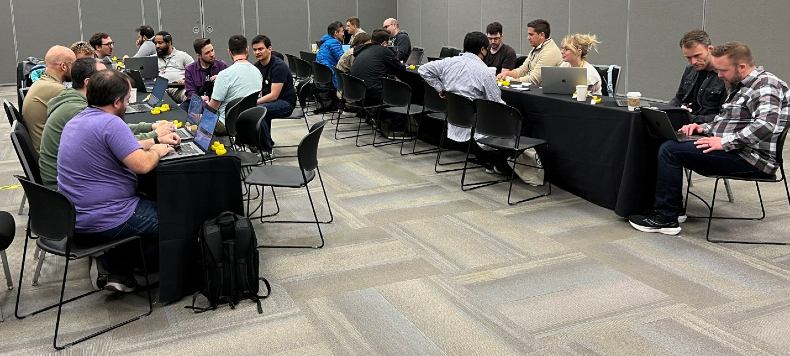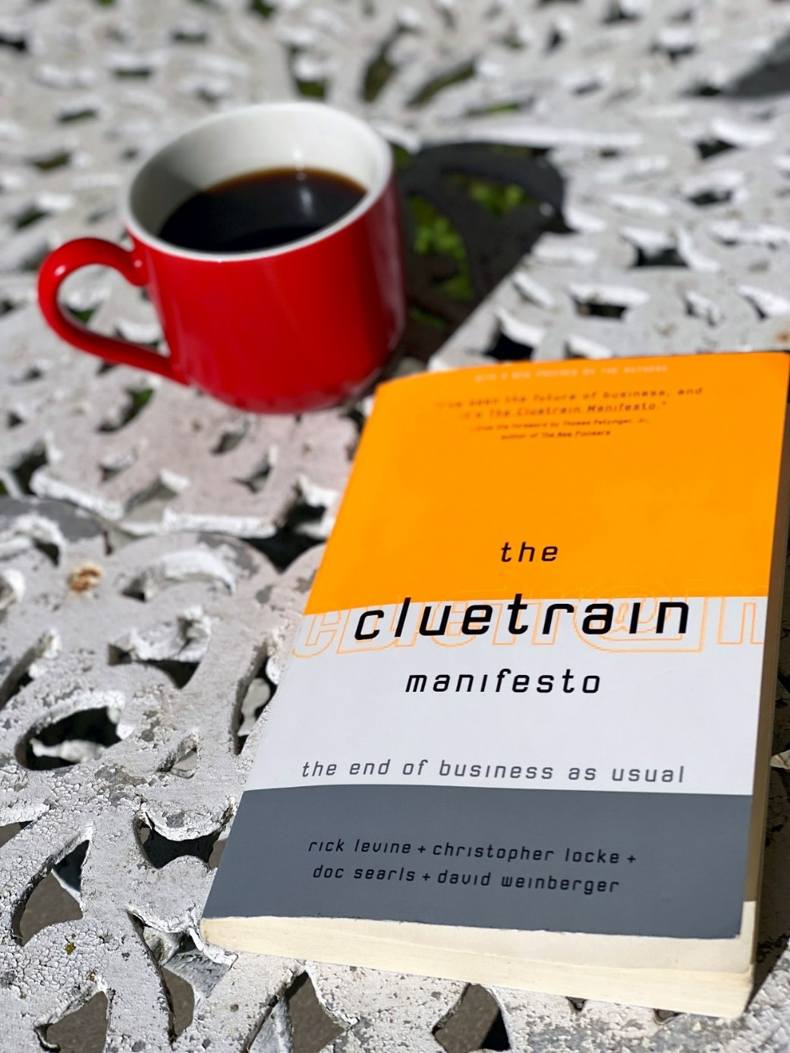We lost something when we let marketing attribution mean more than connecting with people.
At the MarketingProfs B2B Forum in 2022, I spoke about making marketing more personal—not personalized. The trend toward machinated marketing automation and intrusive digital advertising is not awesome. Yes, those things are necessary, but I think we can all admit that some bad actors (certainly not Nicolas Cage) took things too far.
I was there in the trenches, marketing a "marketing solutions" brand for six years. We helped businesses navigate the best options for standing out in a crowded marketplace. But things increasingly became not great in digital advertising and marketing.
I'm now two years in as head of marketing for a software development consulting agency, and we're doing things a little bit differently.
Showing up in communities we care about has been a big focus to increase brand awareness and drive demand generation in a more human way.

Above: Double Agents pair with attendees during RailsConf sponsored office hours at the Test Double lab.
We've been working toward humanity and community in several ways:
- Supporting a kaleidoscope of voices
- Cultivating the next generation of thought leaders by speaking at key conferences
- Sponsoring conferences with a twist: no booth—give us a room and let us offer pair programming office hours
- Hosting invite-only Engineering Leader Roundtable dinners to support networking and deeper conversations about challenges
I've been pondering how to translate the amazing community-building aspects of those things throughout the year. So I started thinking about literally building a community.
The trend toward private social communities is a big deal. Many such communities have been invaluable to me as a marketer:
- Staying engaged with Together Digital got me through the first pandemic year.
- Diving into Analytics for Marketers and Email Geeks helped me make connections to narrow down privacy-minded Web analytics options by talking to real people using the tools.
- And the MarketingProfs PRO community recently made the transition from a Facebook Group to Slack!
For months, I've been evaluating options and planning. We are now prepped to launch a Test Double-hosted community to connect with people who care about the same things we do. We're calling it NEAT, or Not Everything's About Technology.
(There's a lot to this. So I'm going to break up this part of my "Sales Enablement: Good or Bad" journey into why and how. In this article, we're covering the why!)
Starting a community both for developers and for engineering leaders began with defining goals:
- Spark interest and connections with humans behind the screens.
- Engage in conversations about the things that cause a commotion in our heart.
- Create online and physical spaces alike to foster genuine community-building.
Cool. But why do people appreciate connections, conversations, and community? The key is that the people we want to connect with not only have an interest in similar topics but also care deep down about similar philosophies or approaches.
That's when I remembered a little book that's been sitting on my shelf for two decades.

To paraphrase Inigo Montoya, I went back to the beginning. I remembered that marketing as a craft is all about creating conversation and community.
"The audience is listening, because people are attracted to precisely the difference the Net provides: the sound of human beings talking with one another as human beings—the sound of a million conversations whose primary purpose, for once, is not to sell us something." (Christopher Locke, "Internet Apocalypto," The Cluetrain Manifesto)
The book was inspiring when it was published in 2000 because it dug into why the Internet sparked change.
Rereading Cluetrain in 2023 is...
- Heartwarming (we all somehow did that!)
- Amusing (newsgroups, lol)
- A kick in the pants (to stop bad actors from ruining the Internet)
10/10, would recommend you add The Cluetrain Manifesto to your summer reading list. But here are some highlights to get you started—from an authentic marketing perspective, naturally.
Cluetrain focuses not on technology but on two deeply human qualities:
- The engagement and passion-for-quality of genuine craft.
- Conversations among recognizably human voices.
(Christopher Locke and David Weinberger, "EZ Answers," The Cluetrain Manifesto)
The collection of incredibly prescient musings builds on the idea that markets are conversations. Doc Searls points out that if conversations are inherently human, businesses better get real about engaging in them authentically. And they need to do so "as a person with a name, a point of view, a sense of humor, and passion."
We've forgotten why it's so powerful for brands to show up as a kaleidoscope of individual voices.
I've been working toward how to make marketing more human in an increasingly digital-only world. That feels alternately impossible... and super rewarding when I manage to make it happen.
"Marketing isn't going to go away. Nor should it. But it needs to evolve rapidly and thoroughly.... The voices are back, and voice brings craft: work by unique individuals motivated by passion.... Marketing needs to become a craft." (Doc Searls, "Markets are Conversations," The Cluetrain Manifesto)
Why is it so important for marketing to find its voice and focus on craft?
The deep attraction of the Internet in the early days was all about community. Seriously, those early game chat rooms on AOL and Prodigy were not about playing chess or checkers. (If you know, you know.)
"One definition of community is a group of people who care about each other more than they have to." (David Weinberger, "The Longing," The Cluetrain Manifesto)
That really cuts to the heart of what I've been thinking about in building a community. People miss the days of user groups and local meetups. Those days somehow fizzled out, even pre-pandemic. Social media has become fractured. Twitter post-takeover has disrupted what was once an active, cohesive software engineering community.
The act of software development is inherently a creative craft. The ability to come together and share what goes into making that craft is important. As consultants, our senior software engineers' primary function is to help people.
All of those things fit together.
Thesis #84 in The Cluetrain Manifesto sums it up: "We know some people from your company. They're pretty cool online. Do you have any more like that you're hiding? Can they come out and play?"
Yes. Yes, we do. And yes, they can.
We're going to show up and create connection, conversation, and community.
More Resources on Marketing Community-Building
The Importance of B2B Communities: What's in It for Marketers?
Building Communities and the Future of Event Marketing: Mia Masson on Marketing Smarts [Podcast]
Keep Consumers From Cheating on You: Foster a Community to Stay Together




